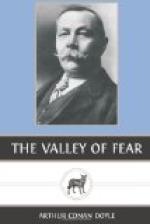“He’s the chief foreman of the Iron Dike Company. He’s a hard citizen, an old colour sergeant of the war, all scars and grizzle. We’ve had two tries at him; but had no luck, and Jim Carnaway lost his life over it. Now it’s for you to take it over. That’s the house—all alone at the Iron Dike crossroad, same as you see here on the map—without another within earshot. It’s no good by day. He’s armed and shoots quick and straight, with no questions asked. But at night—well, there he is with his wife, three children, and a hired help. You can’t pick or choose. It’s all or none. If you could get a bag of blasting powder at the front door with a slow match to it—”
“What’s the man done?”
“Didn’t I tell you he shot Jim Carnaway?”
“Why did he shoot him?”
“What in thunder has that to do with you? Carnaway was about his house at night, and he shot him. That’s enough for me and you. You’ve got to settle the thing right.”
“There’s these two women and the children. Do they go up too?”
“They have to—else how can we get him?”
“It seems hard on them; for they’ve done nothing.”
“What sort of fool’s talk is this? Do you back out?”
“Easy, Councillor, easy! What have I ever said or done that you should think I would be after standing back from an order of the Bodymaster of my own lodge? If it’s right or if it’s wrong, it’s for you to decide.”
“You’ll do it, then?”
“Of course I will do it.”
“When?”
“Well, you had best give me a night or two that I may see the house and make my plans. Then—”
“Very good,” said McGinty, shaking him by the hand. “I leave it with you. It will be a great day when you bring us the news. It’s just the last stroke that will bring them all to their knees.”
McMurdo thought long and deeply over the commission which had been so suddenly placed in his hands. The isolated house in which Chester Wilcox lived was about five miles off in an adjacent valley. That very night he started off all alone to prepare for the attempt. It was daylight before he returned from his reconnaissance. Next day he interviewed his two subordinates, Manders and Reilly, reckless youngsters who were as elated as if it were a deer-hunt.
Two nights later they met outside the town, all three armed, and one of them carrying a sack stuffed with the powder which was used in the quarries. It was two in the morning before they came to the lonely house. The night was a windy one, with broken clouds drifting swiftly across the face of a three-quarter moon. They had been warned to be on their guard against bloodhounds; so they moved forward cautiously, with their pistols cocked in their hands. But there was no sound save the howling of the wind, and no movement but the swaying branches above them.




